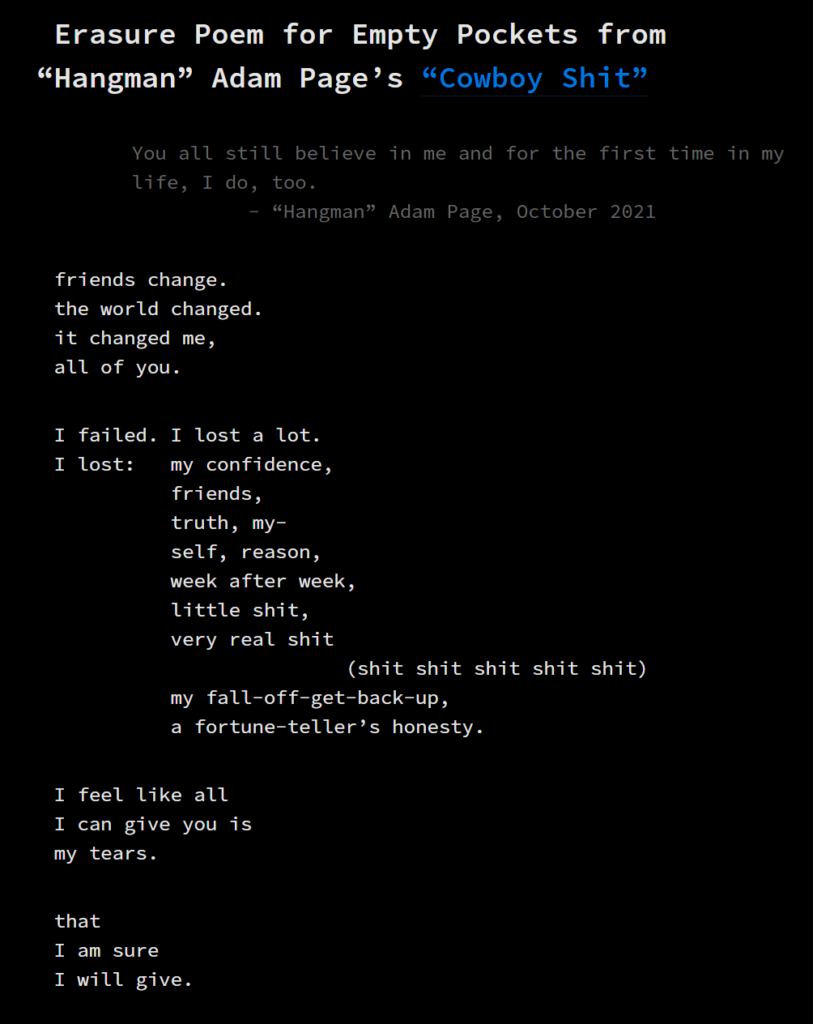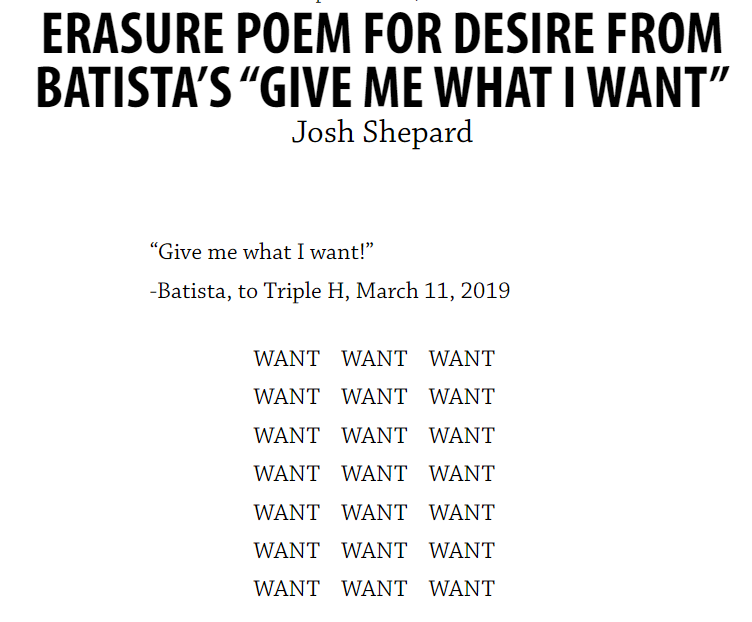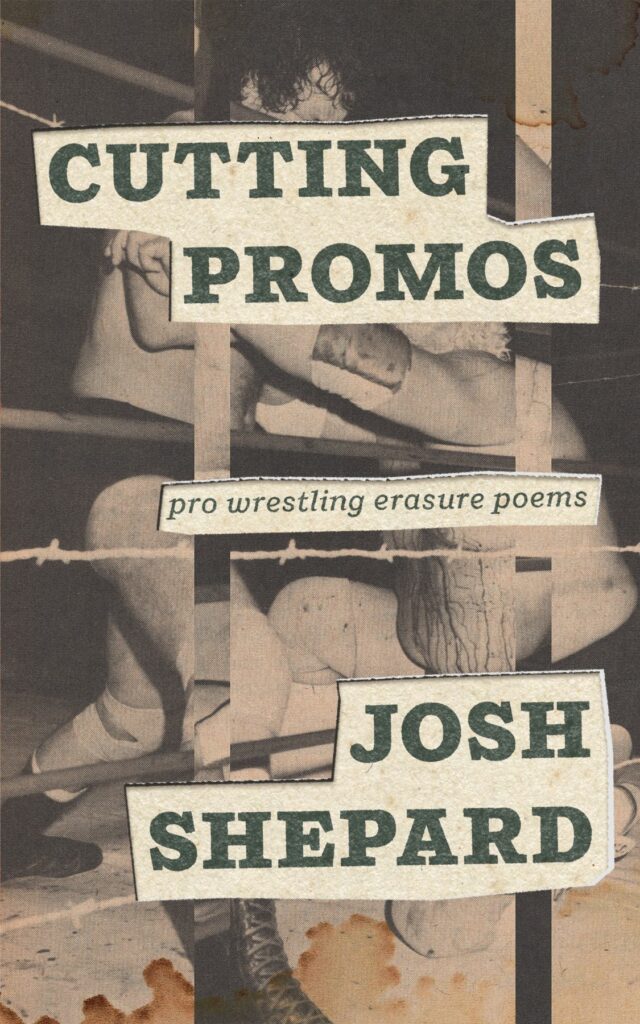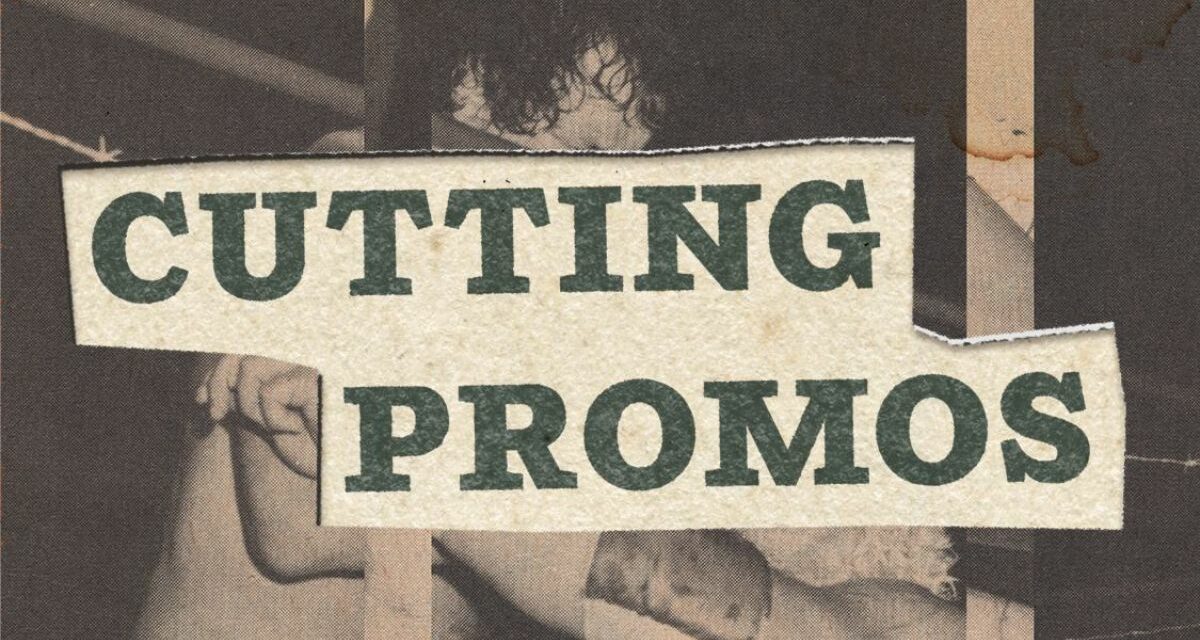The subgenre of wrestling poetry, or poetry about wrestling, is a thriving art. Books such as Michigan poet laureate Nandi Comer’s Tapping Out and Quinn Carver Johnson’s The Perfect Bastard are a testament to this, and they are just two examples in which the books, and the poetry within, are as diverse as professional wrestling itself.
In Comer’s collection, the “relentless motions and blinding colors of lucha libre” provide a backdrop for the poetry in Tapping Out, while in Johnson’s book, “we follow a non-binary wrestler known as The Perfect Bastard, who uses they/them pronouns, as they tour with a wrestling promotion through the Midwest,” according to a SlamWrestling review by Gina Femia.
In both of these books, as different as they are, and like most books, the words were written by the poets, Comer and Johnson, but there’s an exciting new collection of poetry that was, at least to start, written by the wrestlers the poems are about.
Josh Shepard’s Cutting Promos: Pro Wrestling Erasure Poems (BRUISER), uses wrestling promos as the basis for his poems. Shepard then carefully cuts away, or erases, much of the text of the promo, in order to craft a poem that encapsulates the essence of the original promo, while creating a wholly new piece of literature. For an example of this, see Shepard’s “Erasure Poem for Empty Pockets,” as originally published by BRUISER, as well as in his new book. Shepard took the text of a five-minute “Hangman” Adam Page promo and concentrated the words and emotions into the poem seen below.

Erasure Poem for Empty Pockets courtesy of Josh Shepard and BRUISER
Shepard explained a bit of his process to create an erasure poem. For those who don’t already know, “an erasure poem involves taking a piece of writing and then selecting words to keep and words to delete, often through highlighting or blacking out, and the words that remain create a new, found poem: an erasure.”
With that in mind, after sourcing a promo, Shepard would take a look and figure out how to proceed next. Sometimes he would search for interesting words or turns of phrase that would jump off the page and work from there. From there, Shepard said, “you can start to link words or phrases together and see what kind of poem takes shape. Other times I would just float down the page word by word trying to form new phrases, pairing unlikely words for instance, or creating new syntax.”
Sometimes the words chosen at the beginning of the process would inform what kinds of words he found himself searching for or paying attention to as he found his way through the process. Often enough, Shepard said, “the poem that comes forth is as much a surprise to me as it is to the reader, but somehow each one seems to ring true or express something that I’m feeling during the process of writing or have felt at some point or another and I think the collection as a whole seems to speak from the same voice.”
For a more distilled and wonderfully absurd example of Shepard’s process, see his poem inspired by Batista’s meme-fied “Give me what I want” promo directed at Triple H, in which Shepard simply, but smartly, removes everything except the word WANT, yelled in all-caps.

Erasure Poem for Desire courtesy of Josh Shepard and HAD
Shepard currently resides in Oklahoma City, Oklahoma, where he works for the public library. He writes poetry mostly, and his writing has been published in literary publications like Waxwing, The Daily Drunk, and HAD, among others. He authored the microchapbook Inside Voice: Poems Overheard (Ghost City Press, 2022), a collection of found poems written during his time working in bookstores and libraries, and now the collection Cutting Promos: Pro Wrestling Erasure Poems, which was recently published as part of the debut series of zines from the multimedia webzine and micropress BRUISER.
Part of the beauty of Shepard’s poetry is that while the words themselves come from professional wrestling promos, Shepard’s poems, once extracted from the source material, aren’t explicitly about wrestling. They’re about universal experiences and emotions, like desire, loss, depression, joy, and gratitude, so the reader doesn’t exactly need to know who it was that originally spoke the words, in order to enjoy the poems. Not that it doesn’t help. I dare you to read the above poem and not conjure an image of a sunglasses and blazer-wearing Batista, repeatedly screaming the word “want” into a live microphone.

Josh Shepard
Perhaps contrary to expectations, Shepard didn’t follow wrestling closely until he was an adult, although it was always sort of around while he was a kid. Shepard said his introduction to wrestling was video games, and his uncle’s copy of WWF Raw for Sega Genesis, specifically “Doink the Clown’s 16-bit carnival of entrance music, Luna Vachon’s terrifying, pixelated visage, and Bam Bam Bigelow covered from literal head to toe in flames,” and later WWF Royal Rumble, before War Zone on PlayStation, and even later, games like Def Jam Vendetta. Shepard said that soon after video games came “channel flipping and discovering a bleeped and bird-flipping Stone Cold Steve Austin.” Here, he found himself “mesmerized by the interview between Jim Ross and Mankind.”
In college, he started watching again, “admittedly half-ironically,” and over time got completely sucked in. Shepard said, “I started diving in, watching stuff from when I was a kid, international and indie stuff that I’d never seen before, studying it through the lens of a student of storytelling and performance, and I’ve been hooked ever since. I would frequently have spells where I would walk away for a time and pop back in for the big four WWE PPVs—finding myself and my friends growing disappointed with booking and shows hardly watchable between ad breaks—until AEW came along and drew me back in.”
Time was right to write. “After unexpectedly finding myself without a job and with more time on my hands at the onset of the pandemic, I dug in deeper and found myself writing the poems that would become Cutting Promos,” he said.
If all Shepard did was sculpt his poetry from pro wrestling promos, that would be a creative, unique, and enjoyable achievement, but in addition to this, he organized his collection into the structure of a classic wrestling match, which elevates Cutting Promos into a greater thing of beauty. Shepard’s book transitions from the lock-up, to the shine, to the heat, to hope spots and cut-offs, and finally to the finish, with poems relating, thematically, to each section, so there is an overall flow to the collection, as well as the individual poems, that wrestling fans, especially, can appreciate. The last poem in the collection, “For Gratitude,” crafted from Daniel Bryan’s remarkable return promo on March 20, 2018, is a joyful and uplifting poem that can be understood and enjoyed by anyone who reads it, but for a wrestling fan, it’s a challenge to read without tearing up.
Shepard offered this about his creative process. After he more or less finds the poem, rather than present the resulting erasure as a blackout poem, he retypes it into stanzas. The shapes of the poems in this collection vary as widely as the characters whose promos he borrows from. “I think of the poems in this collection as being in conversation in a lot of ways,” he said. “I think about how in a recent interview, poet Todd Dillard described the ways a poem is didactic. A poem like ‘Two Erasures for Bipolar Disorder’ taken from Macho Man’s ‘Cream of the Crop’ promo is presented to the reader as two poems (or one poem) with no instruction for how to approach reading it. By interacting with the poem, the reader learns how to read it (or better yet, the many ways a poem can be read!).”
Shepard’s Cutting Promos: Pro Wrestling Erasure Poems is a sharp and concise collection of poetry that can be read and enjoyed by lovers of wrestling, lovers of poetry, and the relatively small but vocal enclave of individuals who enjoy both. It is accessible and quick, but will be appreciated even more so after multiple reads. It is a spectacular thing of beauty and brutality, like your favorite five-star wrestling match.

Limited quantities of Cutting Promos are currently available online through the BRUISER Store, while people local to Oklahoma City can find copies on the shelf now at The Floating Bookshop, along with other BRUISER titles, and Shepard said, for those interested in the intersection of literature and pro wrestling, you can follow him on X (@JoshShepard) and Instagram (@joshshepardofficial).
RELATED LINK

